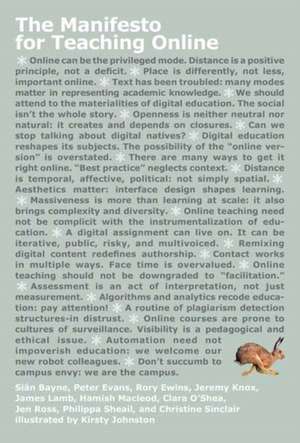The Manifesto for Teaching Online
Autor Sian Bayneen Limba Engleză Paperback – 14 sep 2020
Preț: 180.36 lei
Nou
Puncte Express: 271
Preț estimativ în valută:
34.51€ • 37.61$ • 29.08£
34.51€ • 37.61$ • 29.08£
Carte disponibilă
Livrare economică 02-16 aprilie
Livrare express 18-22 martie pentru 26.94 lei
Preluare comenzi: 021 569.72.76
Specificații
ISBN-13: 9780262539838
ISBN-10: 0262539837
Pagini: 224
Dimensiuni: 136 x 201 x 16 mm
Greutate: 0.39 kg
Editura: MIT Press Ltd
ISBN-10: 0262539837
Pagini: 224
Dimensiuni: 136 x 201 x 16 mm
Greutate: 0.39 kg
Editura: MIT Press Ltd
Notă biografică
Siân Bayne is Professor at Moray House School of Education and Sport at the University of Edinburgh, where she is Director of the Centre for Research in Digital Education.
Peter Evans is Senior Teaching Fellow at Moray House School of Education and Sport at the University of Edinburgh.
Rory Ewins is Lecturer at Moray House School of Education and Sport at the University of Edinburgh.
Jeremy Knox is Lecturer at Moray House School of Education and Sport at the University of Edinburgh. He is Codirector of the Centre for Research in Digital Education within the School of Education.
James Lamb is Lecturer at Moray House School of Education and Sport at the University of Edinburgh.
Hamish Macleod is Honorary Fellow and Senior Lecturer at Moray House School of Education and Sport at the University of Edinburgh.
Clara O'Shea is Associate Lecturer at Moray House School of Education and Sport at the University of Edinburgh.
Jen Ross is Senior Lecturer at Moray House School of Education and Sport at the University of Edinburgh. She is Codirector of the Centre for Research in Digital Education within the School of Education.
Philippa Sheail is Lecturer at Moray House School of Education and Sport at the University of Edinburgh.
Christine Sinclair is Honorary Fellow at Moray House School of Education and Sport at the University of Edinburgh.
Peter Evans is Senior Teaching Fellow at Moray House School of Education and Sport at the University of Edinburgh.
Rory Ewins is Lecturer at Moray House School of Education and Sport at the University of Edinburgh.
Jeremy Knox is Lecturer at Moray House School of Education and Sport at the University of Edinburgh. He is Codirector of the Centre for Research in Digital Education within the School of Education.
James Lamb is Lecturer at Moray House School of Education and Sport at the University of Edinburgh.
Hamish Macleod is Honorary Fellow and Senior Lecturer at Moray House School of Education and Sport at the University of Edinburgh.
Clara O'Shea is Associate Lecturer at Moray House School of Education and Sport at the University of Edinburgh.
Jen Ross is Senior Lecturer at Moray House School of Education and Sport at the University of Edinburgh. She is Codirector of the Centre for Research in Digital Education within the School of Education.
Philippa Sheail is Lecturer at Moray House School of Education and Sport at the University of Edinburgh.
Christine Sinclair is Honorary Fellow at Moray House School of Education and Sport at the University of Edinburgh.
Cuprins
Section 1: Politics and instrumental logics
1. There are many ways to get it right online. 'Best practice' neglects context.
2. We should attend to the materialities of digital education. The social isn't the whole story.
3. Online teaching need not be complicit with the instrumentalisation of education.
4. Online teaching should not be downgraded into 'facilitation'.
5. Can we stop talking about digital natives?
Section 2: Beyond Words
6. Text has been troubled: many modes matter in representing academic knowledge.
7. Aesthetics matter: interface design shapes learning.
8. Remixing digital content redefines authorship.
9. Assessment is an act of interpretation, not just measurement.
10. A digital assignment can live on. It can be iterative, public, risky, and multi-voiced.
Section 3: Re-coding education
11. Openness is neither neutral nor natural: it creates and depends on closures.
12. Massiveness is more than learning at scale: it also brings complexity and diversity.
13. Algorithms and analytics re-code education: pay attention!
14. Automation need not impoverish education: we welcome our new robot colleagues.
Section 4: Face, space and place
15. Online can be the privileged mode. Distance is a positive principle, not a deficit.
16. Contact works in multiple ways. Face-time is over-valued.
17. Place is differently, not less, important online.
18. Distance is temporal, affective, political: not simply spatial.
Section 5: Surveillance and (Dis)trust
19. Online courses are prone to cultures of surveillance. Visibility is a pedagogical and ethical issue.
20. A routine of plagiarism detection structures-in distrust.
1. There are many ways to get it right online. 'Best practice' neglects context.
2. We should attend to the materialities of digital education. The social isn't the whole story.
3. Online teaching need not be complicit with the instrumentalisation of education.
4. Online teaching should not be downgraded into 'facilitation'.
5. Can we stop talking about digital natives?
Section 2: Beyond Words
6. Text has been troubled: many modes matter in representing academic knowledge.
7. Aesthetics matter: interface design shapes learning.
8. Remixing digital content redefines authorship.
9. Assessment is an act of interpretation, not just measurement.
10. A digital assignment can live on. It can be iterative, public, risky, and multi-voiced.
Section 3: Re-coding education
11. Openness is neither neutral nor natural: it creates and depends on closures.
12. Massiveness is more than learning at scale: it also brings complexity and diversity.
13. Algorithms and analytics re-code education: pay attention!
14. Automation need not impoverish education: we welcome our new robot colleagues.
Section 4: Face, space and place
15. Online can be the privileged mode. Distance is a positive principle, not a deficit.
16. Contact works in multiple ways. Face-time is over-valued.
17. Place is differently, not less, important online.
18. Distance is temporal, affective, political: not simply spatial.
Section 5: Surveillance and (Dis)trust
19. Online courses are prone to cultures of surveillance. Visibility is a pedagogical and ethical issue.
20. A routine of plagiarism detection structures-in distrust.
